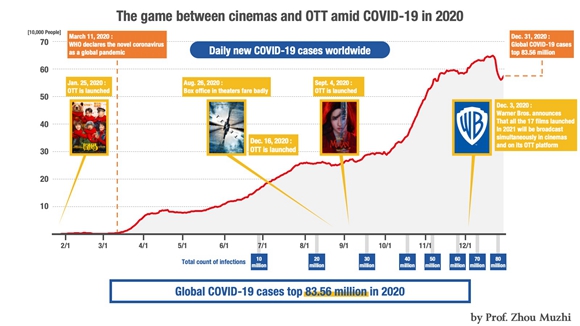Hit and recover amid COVID-19: China rises as world's largest film market

The index also reveals the following sets of data.
The top 10 cities in terms of box office were Shanghai, Beijing, Shenzhen, Guangzhou, Chengdu, Chongqing, Hangzhou, Wuhan, Xi'an, and Suzhou.
The top 10 cities in terms of viewing trips were Shanghai, Beijing, Chengdu, Guangzhou, Shenzhen, Chongqing, Wuhan, Hangzhou, Xi'an, and Suzhou.
The top 10 cities in terms of per capita viewing trips were Shenzhen, Zhuhai, Haikou, Hangzhou, Nanjing, Changsha, Wuhan, Guangzhou, Shanghai, and Xi'an.
The top 10 cities in terms of per capita box office were Shenzhen, Beijing, Shanghai, Hangzhou, Zhuhai, Guangzhou, Nanjing, Haikou, Changsha, and Lhasa.
It is particularly noteworthy that during the epidemic period, numbers of screens and theaters in China increased rather than decreased. The number of screens in China increased from 2,668 in 2005 to 75,581 in 2020, a 27-fold increase.
From October 2019 to May 2021, numbers of cinemas in 203 of 297 Chinese cities increased. Specifically, Chengdu, Suzhou, Guangzhou, Wuhan, Zhengzhou, Changzhou, Baoding, Beijing, Hangzhou and Shijiazhuang were the top 10 cities with biggest increase. Numbers of cinemas decreased in 38 cities, however, with Siping, Taizhou and Jiujiang leading the decrease. That means 826 theaters in total were added in China during this period.
3. OTT a game changer amid COVID-19
COVID-19 undermined box office during the 2020 Spring Festival Holiday, but triggered a revolution. "Lost in Russia," originally scheduled for release in cinemas, premiered on ByteDance's streaming platforms for free on Jan. 25, 2021, the first day of the Lunar New Year, after it was purchased by the tech firm for 630 million yuan.
The movie, despite missing its theatrical release, was viewed 600 million times in the first three days on ByteDance's four video apps – Douyin, Huoshan, Jinri Toutiao, and Xigua Video, with a total number of 180 million individual viewers. The movie brought numerous viewers to those video apps.
OTT stands for "Over The Top" and refers to any streaming service that delivers content over the internet. International major OTT platforms include Netflix, Amazon Prime, Disney+, Hulu, and HBO Max, and domestic platforms include Aiqiyi, Tencent Video, and Youku.
ByteDance created a brand new mode of movie showing, making "Lost in Russia" the first movie to skip theaters to premier on an OTT platform amid the COVID-19 epidemic.
In 2020, the first blockbuster that premiered online was the Disney-made US$200-million "Mulan." On Sept. 4, without theatrically released in North America, Disney premiered the movie on Disney+, which was launched in November, and raked in viewing and revenue.
On Dec. 4, 2020, Warner Bros. announced that all the 17 films launched in 2021 will be broadcast simultaneously in U.S. cinemas and its OTT platform HBO Max, a move that systemically changed the eyeball game.
"007: No Time to Die," a US$250-million blockbuster, also attracted much attention during the pandemic. The film was originally slated for release in theaters globally in April 2020, but has been delayed time and again without a set date yet due to the pandemic. On May 26, 2021, Amazon suddenly announced a US$8.45-billion acquisition of MGM, the 007 series producer. Given that Amazon has an OTT platform of more than 200 million subscribers -- Amazon Prime Video, how and when "007: No Time to Die" will be released is a question raised by many people.
Now, big-budget blockbusters hit OTT platforms and cinemas simultaneously, or just OTT platforms exclusively. An OTT strategy for a film has not only become a major factor that affects the film's box office, but also had an impact on the future of the film maker.

4. Chinese market catapults domestic films to top earners
Chinese domestic films in 2020 had a strong showing. According to Box Office Mojo data, "The Eight Hundred" became the top earner worldwide in 2020. Other Chinese films in the top 10 earners included "My People, My Homeland" at No.4, "Legend of Deification" at No. 8, and "A little Red Flower" at No. 9. Moreover, Chinese film "The Sacrifice" ranked 14th. A string of domestic films made their way into the top at the world's box office thanks to a strong rebound in the Chinese movie market.
The contribution of domestic movies to China's box office had fluctuated between 50% and 60% since 2005, and the figure surged to 83.7% in 2020.
China's box office has skyrocketed over the past 20 years, from 2.05 billion yuan in 2005 to 64.27 billion yuan in 2019, an increase of 30 times. With the COVID-19 epidemic curbed effectively, the world's biggest film market will embrace for a bigger rise in box office, usher in a golden era of China's film industry.





































